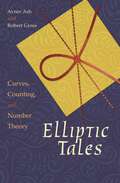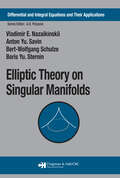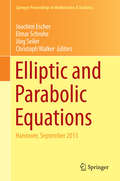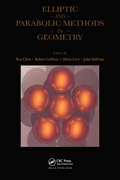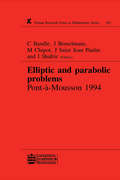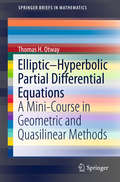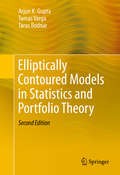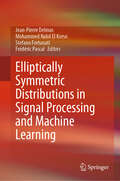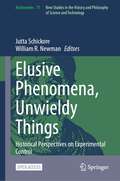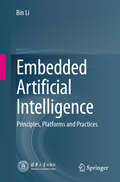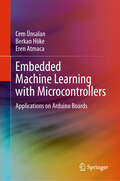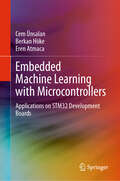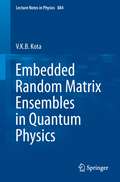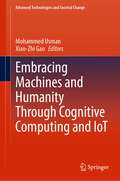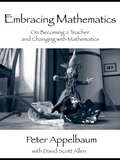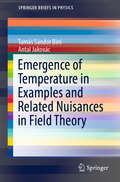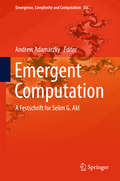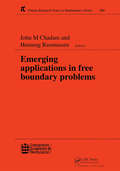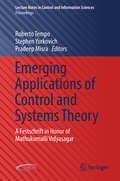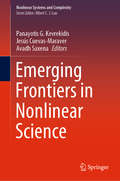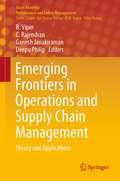- Table View
- List View
Elliptic Systems of Phase Transition Type (Progress in Nonlinear Differential Equations and Their Applications #91)
by Nicholas D. Alikakos Giorgio Fusco Panayotis SmyrnelisThis book focuses on the vector Allen-Cahn equation, which models coexistence of three or more phases and is related to Plateau complexes – non-orientable objects with a stratified structure. The minimal solutions of the vector equation exhibit an analogous structure not present in the scalar Allen-Cahn equation, which models coexistence of two phases and is related to minimal surfaces. The 1978 De Giorgi conjecture for the scalar problem was settled in a series of papers: Ghoussoub and Gui (2d), Ambrosio and Cabré (3d), Savin (up to 8d), and del Pino, Kowalczyk and Wei (counterexample for 9d and above). This book extends, in various ways, the Caffarelli-Córdoba density estimates that played a major role in Savin's proof. It also introduces an alternative method for obtaining pointwise estimates.
Elliptic Tales: Curves, Counting, and Number Theory
by Robert Gross Avner AshA look at one of the most exciting unsolved problems in mathematics todayElliptic Tales describes the latest developments in number theory by looking at one of the most exciting unsolved problems in contemporary mathematics—the Birch and Swinnerton-Dyer Conjecture. In this book, Avner Ash and Robert Gross guide readers through the mathematics they need to understand this captivating problem.The key to the conjecture lies in elliptic curves, which may appear simple, but arise from some very deep—and often very mystifying—mathematical ideas. Using only basic algebra and calculus while presenting numerous eye-opening examples, Ash and Gross make these ideas accessible to general readers, and, in the process, venture to the very frontiers of modern mathematics.
Elliptic Theory on Singular Manifolds (Differential and Integral Equations and Their Applications)
by Vladimir E. Nazaikinskii Anton Yu. Savin Bert-Wolfgang Schulze Boris Yu. SterninThe analysis and topology of elliptic operators on manifolds with singularities are much more complicated than in the smooth case and require completely new mathematical notions and theories. While there has recently been much progress in the field, many of these results have remained scattered in journals and preprints.Starting from an ele
Elliptic and Modular Functions from Gauss to Dedekind to Hecke
by Ranjan RoyThis thorough work presents the fundamental results of modular function theory as developed during the nineteenth and early-twentieth centuries. It features beautiful formulas and derives them using skillful and ingenious manipulations, especially classical methods often overlooked today. Starting with the work of Gauss, Abel, and Jacobi, the book then discusses the attempt by Dedekind to construct a theory of modular functions independent of elliptic functions. The latter part of the book explains how Hurwitz completed this task and includes one of Hurwitz's landmark papers, translated by the author, and delves into the work of Ramanujan, Mordell, and Hecke. For graduate students and experts in modular forms, this book demonstrates the relevance of these original sources and thereby provides the reader with new insights into contemporary work in this area.
Elliptic and Parabolic Equations
by Joachim Escher Elmar Schrohe Jörg Seiler Christoph WalkerThe international workshop on which this proceedings volume is based on brought together leading researchers in the field of elliptic and parabolic equations. Particular emphasis was put on the interaction between well-established scientists and emerging young mathematicians, as well as on exploring new connections between pure and applied mathematics. The volume contains material derived after the workshop taking up the impetus to continue collaboration and to incorporate additional new results and insights.
Elliptic and Parabolic Methods in Geometry
by Silvio Levy John Sullivan Ben Chow Robert GulliverThis book documents the results of a workshop held at the Geometry Center (University of Minnesota, Minneapolis) and captures the excitement of the week.
Elliptic and Parabolic Problems: Pont-A-Mousson 1994, Volume 325 (Chapman And Hall/crc Research Notes In Mathematics Ser. #325)
by Michel Chipot C Bandle Josef Bemelmans J Saint Paulin I ShafrirThis Research Note presents some recent advances in various important domains of partial differential equations and applied mathematics including equations and systems of elliptic and parabolic type and various applications in physics,mechanics and engineering.These topics are now part of various areas of science and haveexperienced tremendous development during the last decades.-------------------------------------
Elliptic-Hyperbolic Partial Differential Equations
by Thomas H. OtwayThis text is a concise introduction to the partial differential equations which change from elliptic to hyperbolic type across a smooth hypersurface of their domain. These are becoming increasingly important in diverse sub-fields of both applied mathematics and engineering, for example: * The heating of fusion plasmas by electromagnetic waves * The behaviour of light near a caustic * Extremal surfaces in the space of special relativity * The formation of rapids; transonic and multiphase fluid flow * The dynamics of certain models for elastic structures * The shape of industrial surfaces such as windshields and airfoils * Pathologies of traffic flow * Harmonic fields in extended projective space They also arise in models for the early universe, for cosmic acceleration, and for possible violation of causality in the interiors of certain compact stars. Within the past 25 years, they have become central to the isometric embedding of Riemannian manifolds and the prescription of Gauss curvature for surfaces: topics in pure mathematics which themselves have important applications. Elliptic−Hyperbolic Partial Differential Equations is derived from a mini-course given at the ICMS Workshop on Differential Geometry and Continuum Mechanics held in Edinburgh, Scotland in June 2013. The focus on geometry in that meeting is reflected in these notes, along with the focus on quasilinear equations. In the spirit of the ICMS workshop, this course is addressed both to applied mathematicians and to mathematically-oriented engineers. The emphasis is on very recent applications and methods, the majority of which have not previously appeared in book form.
Elliptically Contoured Models in Statistics and Portfolio Theory
by Arjun K. Gupta Tamas Varga Taras BodnarElliptically Contoured Models in Statistics and Portfolio Theory fully revises the first detailed introduction to the theory of matrix variate elliptically contoured distributions. There are two additional chapters, and all the original chapters of this classic text have been updated. Resources in this book will be valuable for researchers, practitioners, and graduate students in statistics and related fields of finance and engineering. Those interested in multivariate statistical analysis and its application to portfolio theory will find this text immediately useful. In multivariate statistical analysis, elliptical distributions have recently provided an alternative to the normal model. Elliptical distributions have also increased their popularity in finance because of the ability to model heavy tails usually observed in real data. Most of the work, however, is spread out in journals throughout the world and is not easily accessible to the investigators. A noteworthy function of this book is the collection of the most important results on the theory of matrix variate elliptically contoured distributions that were previously only available in the journal-based literature. The content is organized in a unified manner that can serve an a valuable introduction to the subject.
Elliptically Symmetric Distributions in Signal Processing and Machine Learning
by Jean-Pierre Delmas Mohammed Nabil El Korso Stefano Fortunati Frédéric PascalThis book constitutes a review of recent developments in the theory and practical exploitation of the elliptical model for measured data in both classical and emerging areas of signal processing. It develops techniques usable in (among other areas): graph learning, robust clustering, linear shrinkage, information geometry, subspace-based algorithm design, and semiparametric and misspecified estimation. The various contributions combine to show how the goal of inferring information from a set of acquired data, recurrent in statistical signal processing, can be achieved, even when the common practical assumption of Gaussian distribution in the data is not valid. The elliptical model propounded maintains the performance of its inference procedures even when that assumption fails. The elliptical distribution, being fully characterized by its location vector, its scatter/covariance matrix and its so-called density generator, used to describe the impulsiveness of the data, is sufficiently flexible to model heterogeneous applications. This book is of interest to any graduate students and academic researchers wishing to acquaint themselves with the latest research in an area of rising consequence. It is also of assistance to practitioners working in data analysis, wireless communications, radar, and image processing.
Elusive Phenomena, Unwieldy Things: Historical Perspectives on Experimental Control (Archimedes #71)
by Jutta Schickore William R. NewmanThis open access book provides a historical treatment of scientific control in experimentation in the longue durée. The introduction distinguishes four related strands in the history of experimental control: the development of practices to stabilize experimental conditions; the career of the comparative design; the unfolding of methodological discussions about control practices and designs; and the history of the term “control”. Each chapter brings these distinctions to bear on specific historical episodes. The focus is on experiments with complex, elusive phenomena such as perception and learning, irregular movements, and unobservable elements. Such experiments bring control issues to the fore because they are difficult to design and stabilize and often controversial. Together, the chapters show that the local context shapes what exactly is controlled, how control can be accomplished, and how controls are justified. They also show that control strategies and methodological ideas often remain stable for a long time and change only gradually. This book, as well as the volume on analysis and synthesis in experimentation by the same editors, contains contributions by an array of experts from multiple disciplines, making it suitable for historians and philosophers of science and students alike.
Embedded Artificial Intelligence: Principles, Platforms and Practices
by Bin LiThis book focuses on the emerging topic of embedded artificial intelligence and provides a systematic summary of its principles, platforms, and practices. In the section on principles, it analyzes three main approaches for implementing embedded artificial intelligence: cloud computing mode, local mode, and local-cloud collaborative mode. The book identifies five essential components for implementing embedded artificial intelligence: embedded AI accelerator chips, lightweight neural network algorithms, model compression techniques, compiler optimization techniques, and multi-level cascaded application frameworks. The platform section introduces mainstream embedded AI accelerator chips and software frameworks currently used in the industry. The practical part outlines the development process of embedded artificial intelligence and showcases real-world application examples with accompanying code. As a comprehensive guide to the emerging field of embedded artificial intelligence, the book offers rich and in-depth content, a clear and logical structure, and a balanced approach to both theoretical analysis and practical applications. It provides significant reference value and can serve as an introductory and reference guide for researchers, scholars, students, engineers, and professionals interested in studying and implementing embedded artificial intelligence.
Embedded Machine Learning with Microcontrollers: Applications on Arduino Boards
by Cem Ünsalan Berkan Höke Eren AtmacaThis textbook introduces basic and advanced embedded machine learning methods by exploring practical applications on Arduino boards. By covering traditional and neural network-based machine learning methods implemented on microcontrollers, the text is designed for use in courses on microcontrollers and embedded machine learning systems. Following the learning-by-doing approach, the book will enable students to grasp embedded machine learning concepts through real-world examples, providing them with the design and implementation skills needed for a competitive job market. By utilizing a programming environment that enables students to reach and modify microcontroller properties easily, the material allows for fast implementation of the developed system. Students are guided in implementing machine learning methods to be deployed and tested on microcontrollers throughout the book, with the theory behind the implemented methods also emphasized. Sample codes and real-world projects are available for readers and instructors. The book will also be an ideal reference for practicing engineers and electronics hobbyists.
Embedded Machine Learning with Microcontrollers: Applications on STM32 Development Boards
by Cem Ünsalan Berkan Höke Eren AtmacaThis textbook introduces basic embedded machine learning methods by exploring practical applications on STM32 development boards. Covering traditional and neural network-based machine learning methods implemented on microcontrollers, the text is designed for use in courses on microcontrollers, microprocessor systems, and embedded systems. Following the learning by doing approach, the book will enable students to grasp embedded machine learning concepts through real-world examples that will provide them with the design and implementation skills needed for a competitive job market. By utilizing a programming environment that enables students to reach and modify low-level microcontroller properties, the material allows for more control of the developed system. Students will be guided in implementing machine learning methods to be deployed and tested on microcontrollers throughout the book, with the theory behind the implemented methods also emphasized. Sample codes and course slides are available for readers and instructors, and a solutions manual is available to instructors. The book will also be an ideal reference for practicing engineers and electronics hobbyists.
Embedded Random Matrix Ensembles in Quantum Physics
by V.K.B. KotaAlthough used with increasing frequency in many branches of physics, random matrix ensembles are not always sufficiently specific to account for important features of the physical system at hand. One refinement which retains the basic stochastic approach but allows for such features consists in the use of embedded ensembles. The present text is an exhaustive introduction to and survey of this important field. Starting with an easy-to-read introduction to general random matrix theory, the text then develops the necessary concepts from the beginning, accompanying the reader to the frontiers of present-day research. With some notable exceptions, to date these ensembles have primarily been applied in nuclear spectroscopy. A characteristic example is the use of a random two-body interaction in the framework of the nuclear shell model. Yet, topics in atomic physics, mesoscopic physics, quantum information science and statistical mechanics of isolated finite quantum systems can also be addressed using these ensembles. This book addresses graduate students and researchers with an interest in applications of random matrix theory to the modeling of more complex physical systems and interactions, with applications such as statistical spectroscopy in mind.
Embracing Machines and Humanity Through Cognitive Computing and IoT (Advanced Technologies and Societal Change)
by Xiao-Zhi Gao Mohammed UsmanThis book sheds light on systems that learn extensively, with purpose and naturally interact with humans. Improving operations and increasing competitive differentiation among manufacturing organizations by harnessing the power of cognitive abilities, IoT can help build and influence the flow of information—making the shop floor more cognitive through effective processing, analysis, and operational optimization. Now we are seeing the first-hand potential of cognitive computing—its ability to transform businesses, governments, and society. The real potential of the cognitive age can be realized by combining data analysis and statistical reasoning of machines with uniquely human qualities, such as self-directed goals, common sense, and moral values, improving operations and increasing competitive differentiation among manufacturing organizations. By harnessing the power of cognitive abilities, IoT can help build and influence the flow of information—making the shop floor more cognitive through effective processing, analysis, and operational optimization. Cognitive initiatives come in all shapes and sizes, from change to strategy and everything in between. What most successful projects have in common, no matter how ambitious, is they start with a clear view of what technology can do. Therefore, the first job of a cognitive scientists is to gain a firm understanding of cognitive abilities, as presented in this book.
Embracing Mathematics: On Becoming a Teacher and Changing with Mathematics
by Peter Appelbaum with David AllenThis alternative textbook for courses on teaching mathematics asks teachers and prospective teachers to reflect on their relationships with mathematics and how these relationships influence their teaching and the experiences of their students. Applicable to all levels of schooling, the book covers basic topics such as planning and assessment, classroom management, and organization of classroom experiences; it also introduces some novel approaches to teaching mathematics, such as psychoanalytic perspectives and post-modern conceptions of curriculum. Traditional methods-of-teaching issues are recast in a new discourse, provoking new ideas for making mathematics education meaningful to teachers as well as their students. Co-authored by a professor and coordinator of mathematics education programs, with illustrative contributions from practicing elementary, middle, and high school mathematics teachers, this book is a unique collaboration across all pre-college grades, making it ideal for teacher discussion groups at any level. Embracing Mathematics: integrates pedagogy and content exploration in ways that are unique in mathematics education features textboxes with reflection questions and suggested explorations that can be easily utilized as homework for a course or as discussion opportunities for teacher reading groups offers examples of teachers’ action research projects that grew out of their interactions with the main chapters in the book is not narrowly limited to mathematics education but incorporates curriculum studies – an invaluable asset that allows instructors to find more ways to engage students in self-reflexive acts of teaching Embracing Mathematics is intended as a method text for undergraduate and master’s-level mathematics education courses and more specialized graduate courses on mathematics education, and as a resource for teacher discussion groups.
Embracing Reason: Egalitarian Ideals and the Teaching of High School Mathematics (Studies in Mathematical Thinking and Learning Series)
by Daniel Chazan Sandra Callis Michael LehmanThis book tells a single story, in many voices, about a serious and sustained set of changes in mathematics teaching practice in a high school and how those efforts influenced and were influenced by a local university. It includes the writings and perspectives of high school students, high school teachers, preservice teacher candidates, doctoral students in mathematics education and other fields, mathematics teacher educators, and other education faculty. As a whole, this case study provides an opportunity to reflect on reform visions of mathematics for all students and the challenges inherent in the implementation of these visions in US schools. It challenges us to rethink boundaries between theory and practice and the relative roles of teachers and university faculty in educational endeavors.
Emeka's Gift: An African Counting Book
by Ifeoma OnyefuluAs a young African boy travels to visit his grandmother, he passes through the village market, where he sees lots of things Granny would like -- four brooms, five hats, six necklaces, seven musical instruments, and so on. Stunning photographs taken in Emeka's southern Nigerian village illustrate this heartwarming story. The pages in this book are not numbered. Other books by this author are available in this library.
Emergence of Temperature in Examples and Related Nuisances in Field Theory (SpringerBriefs in Physics)
by Antal Jakovác Tamás Sándor BiróField theory, relying on the concept of continuous space and time while confronted with the quantum physical nature of observable quantities, still has some fundamental challenges to face. One such challenge is to understand the emergence of complexity in the behavior of interacting elementary fields, including among other things nontrivial phase structures of elementary matter at high energy density or an atypical emergence of statistical properties, e.g., when an apparent temperature is proportional to a constant acceleration in a homogeneous gravitational field. Most modern textbooks on thermal field theory are mainly concerned with how the field theory formalism should be used if a finite temperature is given. In contrast, this short primer explores how the phenomenon of temperature emerges physically for elementary fields - inquiring about the underlying kinetic field theory and the way energy fluctuations and other noise should be handled - and it investigates whether and how this harmonizes with traditional field theory concepts like spectral evolution, the Keldysh formalism, and phase transitions.
Emergent Computation
by Andrew AdamatzkyThis book is dedicated to Professor Selim G. Akl to honour his groundbreaking research achievements in computer science over four decades. The book is an intellectually stimulating excursion into emergent computing paradigms, architectures and implementations. World top experts in computer science, engineering and mathematics overview exciting and intriguing topics of musical rhythms generation algorithms, analyse the computational power of random walks, dispelling a myth of computational universality, computability and complexity at the microscopic level of synchronous computation, descriptional complexity of error detection, quantum cryptography, context-free parallel communicating grammar systems, fault tolerance of hypercubes, finite automata theory of bulk-synchronous parallel computing, dealing with silent data corruptions in high-performance computing, parallel sorting on graphics processing units, mining for functional dependencies in relational databases, cellular automata optimisation of wireless sensors networks, connectivity preserving network transformers, constrained resource networks, vague computing, parallel evolutionary optimisation, emergent behaviour in multi-agent systems, vehicular clouds, epigenetic drug discovery, dimensionality reduction for intrusion detection systems, physical maze solvers, computer chess, parallel algorithms to string alignment, detection of community structure. The book is a unique combination of vibrant essays which inspires scientists and engineers to exploit natural phenomena in designs of computing architectures of the future.
Emerging Applications in Free Boundary Problems (Chapman And Hall/crc Research Notes In Mathematics Ser.)
by J M ChadamThis Research Note presents a collection of papers on emerging applications in free boundaryproblems. The subjects covered include microgravity, chemical and biological reactions, and electromagnetism and electronics.
Emerging Applications of Control and Systems Theory: A Festschrift In Honor Of Mathukumalli Vidyasagar (Lecture Notes In Control And Information Sciences - Proceedings Ser.)
by Roberto Tempo Stephen Yurkovich Pradeep MisraThis book celebrates Professor Mathukumalli Vidyasagar’s outstanding achievements in systems, control, robotics, statistical learning, computational biology, and allied areas. The contributions in the book summarize the content of invited lectures given at the workshop “Emerging Applications of Control and Systems Theory” (EACST17) held at the University of Texas at Dallas in late September 2017 in honor of Professor Vidyasagar’s seventieth birthday. These contributions are the work of twenty-eight distinguished speakers from eight countries and are related to Professor Vidyasagar’s areas of research. This Festschrift volume will remain as a permanent scientific record of this event.
Emerging Frontiers in Nonlinear Science (Nonlinear Systems and Complexity #32)
by Avadh Saxena Jesús Cuevas-Maraver Panayotis G. KevrekidisThis book explores the impact of nonlinearity on a broad range of areas, including time-honored fields such as biology, geometry, and topology, but also modern ones such as quantum mechanics, networks, metamaterials and artificial intelligence. The concept of nonlinearity is a universal feature in mathematics, physics, chemistry and biology, and is used to characterize systems whose behavior does not amount to a superposition of simple building blocks, but rather features complex and often chaotic patterns and phenomena. Each chapter of the book features a synopsis that not only recaps the recent progress in each field but also charts the challenges that lie ahead. This interdisciplinary book presents contributions from a diverse group of experts from various fields to provide an overview of each field’s past, present and future. It will appeal to both beginners and seasoned researchers in nonlinear science, numerous areas of physics (optics, quantum physics, biophysics), and applied mathematics (ODEs, PDEs, dynamical systems, machine learning) as well as engineering.
Emerging Frontiers in Operations and Supply Chain Management: Theory and Applications (Asset Analytics)
by C. Rajendran B. Vipin Ganesh Janakiraman Deepu PhilipThis edited book addresses the challenges in managing the operations and supply chain of organizations in the era of internet of things and Industry 4.0. It presents cutting edge research on real world operations related problems, in-depth analyses, and relevant managerial implications. Wide variety of solution approaches such as quantitative, quantitative, and simulations are presented in the context of managing the operations and supply chains. Consisting of selected papers from the XXIII Annual International Conference of Society of Operations Management, this volume is part of a two volume series with the other book consisting of chapters on quantitative decision making. This edited book covers various quantitative models on operations and supply chain management such as inventory optimization, machine learning-operations research integrated model for healthcare systems, game-theoretic analysis of review strategies in truthful information sharing, design of contracts in supply chains, supply chain optimization, inventory routing, and shop floor scheduling. In addition to the quantitative models, several innovative heuristics are proposed for different problems. This book explores qualitative models on improving the performance of small and medium enterprises and petroleum industries and a simulation model for staff allocation in the information technology industry. Finally, this book provides review articles on vaccine supply chains and behavioral operations management.The book throws light on the emerging trends in the use of analytics, optimization, and simulation tools and empirical analysis to improve the performance of operations and supply chains of organizations. It will serve as an essential resource for practitioners, students, faculty members and scholars in operations management and related areas to gain knowledge and pursue high quality research on developments in areas such as managing the resource management and the solution methodology---innovative tools employed in addressing the real world problems and the different optimization techniques.

